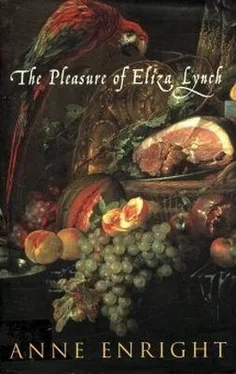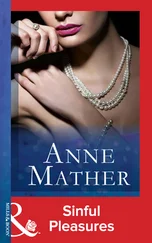The baby kicks like a boy. It kicks like it cannot wait to get out of me. Francine cools my temples with eau de lavande. She whispers, 'Not long. Not long now.' But I do not know how long it will be. I do not know if we will make it to Asuncion. I do not know if it will ever be born, or if I will stay here for ever – for ever on this river, with this water flowing by.
183-, Asuncion
Doctor Stewart liked Asuncion. It was the kind of town where a man could go to pieces in his own good time.
He woke up to it slow. It was some months before he wrote to his aunt to describe this sleepy town of adobe and wood, of red-tiled roofs and secret courtyards. But he could not get it straight in his head. Outside his window, a group of urchins was burying an infant child up to the neck. They were smoking cigars – all of them, including the infant, though his was, of course, handed to his mouth by a factotum. None of them was older than five. They seemed entirely happy.
On the rough desk in front of Stewart was a sheet of paper, stained already with his sweat. It would be handed by a wind-whipped postman into his aunt's Edinburgh fastness, a sort of distant cry. So he filled it full of flowers for her, the smoky blue jacaranda and the bridal orange blossom that would make her mouth purse, as though she were tasting the fruit. What else? In the distance, the cries of salesmen and the complaints of cattle – she had enough of those at home. He might say that the women sometimes wore just the skirts of their dresses, and let the empty bodies flop out behind. Or that they liked to dance with bottles balanced on their heads. Or perhaps not. 'It is all very foreign,' he wrote, then stopped and tried again to think of the distinctive thing to say.
Outside, the urchins sat and watched the infant as the infant watched them, looking from one face to another with an expression that Stewart could not decipher. Perhaps it was quite comfortable, wrapped up like that in the earth. 'The men', he wrote, 'are in the habit of wearing hat brims, without the benefit of a hat, and so our local Indian fellow is jauntily crowned with a halo made of felt.' She would find this image a little Catholic, but it was better than telling her you could tell a prostitute by the gold comb in her hair. Respectable women wore tortoiseshell or wood. A new arrival might get confused (he did not write).
'There is such a lack of iron in the town' (commerce, good), 'that people leave nails to their children and, in their wills, specify how many each should get.' Outside, the chief urchin, in his hat brim and little else, sauntered up to the buried infant and pulled it clear. The child came up like a carrot and, as the red soil fell away, Stewart saw that it was a girl.
'But let us not belittle Asuncion,' he concluded, for his aunt was a clever woman, and he liked her. 'It is made, as every other town is made, of casual encounters and minor conspiracies; of friendliness to strangers and small, ancient irritations between friends. It is a frontier place, the gentlemen a little too rough and the ladies a little too "nice". But it is made, as every other town is made, out of talk.'
The little girl had recovered her personal cigar and now squatted with the others, chewing the stub. Her position afforded Stewart a view of her genitals, flatly presented between her sweet little legs and feet. And indeed she was all sweet, from her toes to the same cigar's dangerously glowing tip. Stewart folded the letter and ran his hand heavily along the crease. He had not mentioned that the talk was of one thing only, and that one thing was his former patient, Eliza Lynch.
Stewart listened to it all. He cultivated the trick of disappearing into the company, so as not to inhibit conversation about events he had personally witnessed (though only after a fashion). He wished, sometimes, that he could remember the way it really was, but mostly he gave in to the stories as they became skewed over the months and years into something high and fantastical, and ever more true.
Mme Cochelet, the French envoy's wife, said that the grand entrance of the Tacuari into Asuncion went thus (she told it, always, in a sort of mime):
The boat glides up alongside the dock. The crowds that have been running along the bank fill the square. The gangplank is let down. Silence. A cart pulls into the Plaza de Palma with twenty bandsmen hanging off the sides, waving their instruments in the air. They jump off the cart and run to the quay and fall in. More silence. Picture it. The dirt. The sloping, cockeyed customhouse, the smell of the river and, in front of them all, a boat the size of a dream.
Finally, the cavalry; all snorting and stamping. Three old barouches trundle to a halt – and there they all are. Carriage number one: fat old Lopez with his outrageous epaulettes, his sword across his lap. Carriage number two: fat old Dona Juana Lopez all swaddled up in black, with her ghastly daughters, Rafaela and Innocencia, equally fat, equally swaddled; their moustachios bristling, their bosoms heaving, and their armpits stained with sweat. Carriage number three: the younger sons, Benigno or, as we call him, Maligno, and with him the ridiculous Admiral (of what fleet, pray tell?) Venancio, tight and buttoned as the upholstery they sit upon, the springs of the carriage singing and sagging as they shift about.
So, the people cheering now in the heat – thousands of them – the band striking up, there is a movement, a glimpse, a flutter of tulle; and there, at the top of the gangway, is a vision. A Juno. A woman of proportions, in a pale lilac gown and matching bonnet, with a stole of lace to hide -Mme Cochelet would bet good money on it – her shame. She would like to say that the bonnet was de trop, or the lilac vulgar, but they were neither, and her first impulse, she could not gainsay it, was to cheer or swoon – this shard of Paris ice that had fallen out of the sky to land on the Plaza de Palma; full now of hushed Paraguayans, who had never seen skin so fair, nor eyes so blue, nor a woman so gloriously large, who had never seen that shade of lilac, except perhaps on a deep forest orchid – the colour of a flower that grows in the dark. Stepping up beside her: the young Lopez in an endless stovepipe hat, too-tight frock coat and excruciating pastel trousers. The apparition takes his proffered arm and floats down to the quay, smiling regally to her right and her left. The crowds part as she drifts through to the first carriage and old Lopez. The son bows and speaks. The vision smiles her visionary smile and lifts a languid hand. It hangs in the air. The old Dictator grunts – at her perhaps, or perhaps at the coachman – and the carriage pulls away at speed, followed at speed by the presidential escort whose polished hooves kick up enough dust to turn the silk lilac ice to soot grey. Eliza Lynch looks down at her dress. So much for Paris.
Up to this moment, Mme Cochelet had hoped against hope that – his satyriasis not withstanding – the young Lopez had somehow married, but it was not to be. When ' La Lincha' was presented to Dona Juana, the old woman (who treated the entire country like it was her own back kitchen) shrieked and struck her breast and ordered her carriage away. This shot off with such force that the now-dusty vision was spattered with excrement. At which, Maligno smiled his little smile, and followed his mother at a gentle trot, before more harm could be done.
Mme Cochelet was fond of this story, which had grown so much in the telling that none of it (save, of course, the lilac dress) was in any way true. She told it for years, sometimes twice in the same week, but she only told it to those she could trust. Mme Cochelet was, after all, married to the French envoy and had to be careful what she said. She started telling it in 1856 after Eliza had a quinta built for her in record time; a simple, easy house of pink marble. She added the dust from the horse's hoofs in 1857, after the young Lopez built a road from Government House straight to its gates in the suburb of La Recoleta. She added the excrement in 1858, after her husband went out there for the first time. They were, you could say, political details. And, much as Stewart admired Mme Cochelet, her defiance of the heat in home-knit stockings, her Norman rectitude when it came to things like covering the milk and sacking the servants, still he thought it unwise of her to disdain La Lincha so freely. To say so often, and so openly, that she 'would rather break bread with a nigger than eat at the house of the Irish whore.' It was entertaining, but possibly unwise. It was true, but it was not pretty.
Читать дальше












